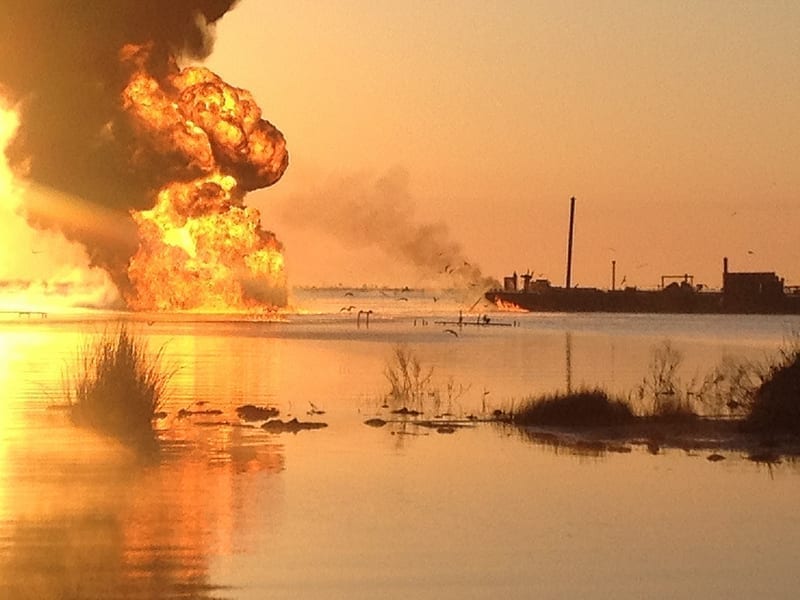Oil. Our modern economy can’t exist without it. It powers our transportation, feeds our growing population, provides a cornucopia of plastic products (and oceans of plastic waste), precipitates wars, fouls our environment, and burning it raises sea levels. Our cultural response to the black, sticky stuff is equally complex and internally contradictory. With offshore drilling back in the news, it’s worth thinking about what we’re willing to accept in exchange for oil.
Oil. Our modern economy can’t exist without it. It powers our transportation, feeds our growing population, provides a cornucopia of plastic products (and oceans of plastic waste), precipitates wars, fouls our environment, and burning it raises sea levels. Our cultural response to the black, sticky stuff is equally complex and internally contradictory. With offshore drilling back in the news, it’s worth thinking about what we’re willing to accept in exchange for oil.
Louisiana is one of the states most involved with the benefits – and costs – of the American oil industry. At the intersection of the Mississippi River and the Gulf of Mexico, where offshore drilling is a major part of the economy, residents of Louisiana depend on oil not just to keep them in vehicles, food, and plastic, but also jobs. Unfortunately, both the ecological cost of oil consumption and the companies involved in offshore drilling are directly and negatively impacting Louisiana.
In March, the Fifth U.S. Circuit Court of Appeals stopped a 2013 lawsuit by the Southeast Louisiana Flood Protection Authority against several major players in the oil and gas industry. The lawsuit alleged that the collective actions of 92 oil and gas companies caused erosion of coastal lands, leaving southern Louisiana increasingly vulnerable to flooding, damage, and loss from hurricanes and tropical storms (which, themselves, are expected to increase in number and severity in a changing climate). The Flood Protection Authority asserted that the industry was responsible for backfilling and restoring canals dredged into sensitive wetlands once they were finished with them, but the court dismissed the case based upon jurisdiction and a lack of an implied legal duty on the part of the industry to clean up its own mess. If it’s going to get done, it’s up to the taxpayers to subsidize corporations by taking on the costs, but not the profits, of doing business.
Over to the east, Florida has its own offshore drilling troubles. Florida’s waters yield very little oil, just 0.1% of our domestic production. It makes sense, then, for Florida to concentrate on the other, more lucrative economic benefits of its stunning coastline, such as tourism. Currently, Florida bans offshore drilling for 225 miles, so that its scenic beauty won’t be ruined by ugly oil rigs. Legislation introduced in Congress would roll back that moratorium and give other states incentives to expand drilling, but nevertheless, Florida persists.

Florida is justified in its worry over the legislative agenda of the Trump administration. One of the multitude of executive orders signed by Trump recently takes aim at Obama-era protections against new offshore drilling in the Arctic, Atlantic, and Pacific oceans as well as related safety regulations. A coalition of environmental groups led by the legal firm Earthjustice filed suit against the Trump administration, claiming that he has no authority to withdraw protections for bodies of water that have been reserved under the Outer Continental Shelf Lands Act. Of course, the American Petroleum Institute disagrees.
In our scramble to suck up enough oil to keep the economy going, we would do well to remember that these companies are not saints. Just as they fought to avoid cleaning up their mess in Louisiana, they also fail at self-regulation. While previous giant spills like Deepwater Horizon and even Exxon-Valdez are “gifts” that keep on giving, every day offshore drilling operations spill enough oil to be seen from space. In fact, that’s how a lot of cheaters are caught. A report released last March showed 479 offshore drilling accidents in the Gulf in 2016, or about nine spills every week. Officially, this meant about 18,000 gallons of oil and chemicals into the Gulf. However, SkyTruth, a nonprofit watchdog organization that uses satellite data to check up on the oil industry, claims that the spills leaked closer to 875,000 gallons – and that’s on the low side. Can you imagine how much worse a further deregulated oil industry would be?
While many Louisianans accept environmental degradation as an inevitable fact of modern life, and so many of the rest of us don’t think about it at all (as long as the cars, food, and plastic keep flowing), how happy does modern life make us after all? A lot of that oil, for which people pay in degraded coastlines, health problems, and increased taxation for cleanups, goes to make stuff like unnecessary and wasteful packaging, and is soon thrown away in a landfill or incinerated. Even more goes to produce food that is never eaten or to transport imported goods that could have created local jobs if produced nearby. What if this expensive, technology-driven, oil-soaked modern life undermines, instead of enhances, the happiness for which we’ve given up so much?


Join the conversation!